
 |
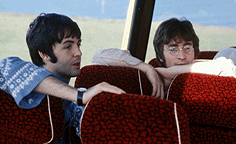 |
The 55-minute special, edited down from ten hours of filming, featured six numbers: ‘Magical Mystery Tour’, ‘Your Mother Should Know’, ‘I Am The Walrus’, ‘Fool On The Hill’, ‘Flying’ and ‘Blue Jay Way’. Two other songs they wrote for the project were never issued – ‘Jessie’s Dream’ and ‘Shirley’s Wild Accordion’. The idea involved a surrealistic mystery trip on a gaily-painted yellow and blue coach. The coach left London on Monday 11th September 1967 and filming of the actual trip was completed on Friday 15th September. Paul McCartney met up with the various Mystery Tour passengers at Allsop Place, near the London Planetarium, which the group had often established as a meeting place prior to some of their British tours. Painting still hadn’t been completed on the bus and it arrived two hours later than its appointed 10.45am departure time. Once they set off they headed for Virginia Water, Surrey, to pick up John, Ringo and George as it was close to Weybridge where two of them lived. They then set off for the West Country and Hampshire, Devon, Cornwall and Somerset. |
| In all there were 43 passengers, apart from The Beatles and film crew (Ringo was billed as Director of Photography). They included four fan club secretaries: Frieda Kelly, Barbara King, Sylvia Nightingale and Jeni Crowley. There were Neil Aspinall and Mal Evans plus a small party of dwarfs, one of whom was Rayston Smith who died in mysterious circumstances in 1989. His biography, Little Legs, revealed that he was a hit man who had killed several people and had served seven years in jail for manslaughter. Neil was now the headman at Apple and was later to comment, “We went out to make a film and nobody had the vaguest idea of what it was all about. What we should have been filming, if anything, was all the confusion because that was the real mystery tour.” Also on board were Luke Kelly, the coach driver Alf Manders, Bill Wall, Linda Lawson, Pamela and Nicola Hale, Elizabeth and Arthur Kelly, Liz Harvey and Michael Gladden. There were also a number of actors and actresses for whom basic parts had been outlined on which they could improvise. They included Scottish actor/poet/comedian Ivor Cutler who portrayed Buster Bloodvessel, a passenger who travelled on all the mystery tours and who developed a passion for Ringo’s Aunt Jessie, played by Jessie Robins. Paul had first spotted Cutler on the television show ‘Late Night Line Up’ and remembered him when casting for the special. |
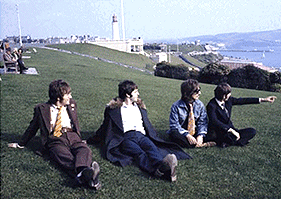 |
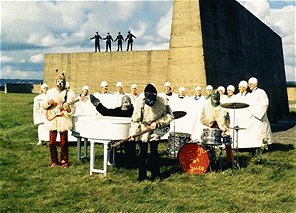 |
One sunny morning, while John and George filmed a sequence at the Atlantic Hotel, Paul and Ringo set off for Tregurrian Beach where they filmed a romantic interlude between Cutler and Robins. The BBC cut this scene when the special was televised, however, they reinstated it when they re-screened ‘Magical Mystery Tour’ in 1979. ‘Rubber Man’ Nat Jackley was filmed by John and George at the Atlantic Hotel swimming pool for a comedy dream sequence in which he was joined by several girls in bikinis. This scene was also consigned to the cutting room floor but it was included in the cartoon storybook of ‘Magical Mystery Tour’ that accompanied the film’s soundtrack EP/album as this was completed before the film was finally edited. Jackley was a British music hall comedian whose gimmick was his ability to twist his neck as if it were rubber. Jackley died at the age of 79 in September 1988. There was also Little George Claydon, a tiny actor who played the Amateur Photographer; Maggie Wright as Maggie the Lovely Starlet, Paul’s mini-skirted girlfriend; Shirley Evans, a professional accordionist; Derek Royce as Jolly Jimmy Johnson, the Tour Courier (he died in January 2000 aged 61) and Mandy Weet as the Tour Hostess. There were various other friends such as Paul’s hairdresser Leslie Cavendish, Paul’s brother Mike McGear and the Apple electronics wizard Alexis Mardas. |
| Travelling
through Devon and Cornwall they picked up a few extra passengers, such
as Spencer Davis (leader of the Spencer Davis Group) with his wife Pauline
and their children. The family had been on holiday near Newquay. There
was a clip of Winwood’s group Traffic performing ‘Here We Go Round The
Mulberry Bush’, but this also ended up on the cutting room floor. Most
of the interior scenes had to be filmed at West Malling RAF Station
near Maidstone, Kent, as Apple Films were unable to book Shepperton
Studios in time. One of the scenes shot on Monday 18th September was
a sequence filmed in Paul Raymond’s Revue Bar in Soho. It featured the
Bonzo Dog Doo Dah Band performing ‘Death Cab for Cutie’, while popular
stripper Jan Carson performed her act. Despite the fact that her bare
breasts had a ‘censored’ strip covering them, the entire sequence was
excised in Japan. The sequence featuring Paul singing ‘Fool On The Hill’ was filmed in Nice, France, on Monday 30th and Tuesday 31st October. When Paul flew to France for the filming he forgot both his passport and his wallet – he was so used to someone else looking after those details! The French authorities wouldn’t allow Paul any credit and filming was delayed while he arranged for money to be sent over from England. The basic story concerns a coach trip that Ringo and his Aunt Jessie have decided to take. They visit a tour office and are talked into going on the Mystery Tour by a young man (John Lennon) wearing a thick moustache. Meanwhile: “Away in the sky, beyond the clouds, live four or five magicians. By casting wonderful spells they turn the most ordinary coach trip into a Magical Mystery Tour.” The magicians, of course, are played by the four Beatles and Mal Evans, dressed in long wizards’ robes and pointed hats. We meet them several times during the course of the journey. The coach has started off to the tune of ‘Magical Mystery Tour’ and the second number we are treated to is ‘Fool On The Hill’. At one point, Paul has a chat with five-year-old Nicola Hale, a touching scene that wasn’t planned or rehearsed. |
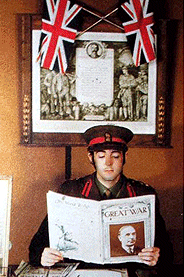 |
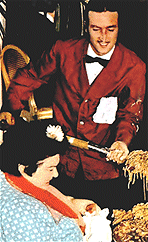 |
Many
of the episodic scenes during the trip are surrealistic, the most visually
intriguing being the one set in front of the high, concrete walls of
the deserted West Malling Aerodrome (the walls were finally demolished
in 1991). There, ‘I Am The Walrus’ was filmed, with The Beatles in their
animal masks and with egg-headed spectators and swaying policemen on
top of the wall. The Marathon Race was held on the same set, with Ringo
driving the coach followed by a line of egg-heads, four midget wrestlers,
racing motor cyclists, a rugby team, a dozen children, five clergymen
and a host of passengers scrambling across the airfield. For ‘Blue Jay Way’, the slightly mystical George Harrison song, a host of people find their way inside a tiny tent to watch George perform the number seated amid swirling smoke clouds. In another scene, Paul plays Major McCartney, with Victor Spinetti as the Recruiting Sergeant. Victor couldn’t take up the invitation of accompanying The Beatles on the trip, but took time off from the film he was making to act out this one scene, which is a variation of his ‘Oh, What A Lovely War’ role. One of the strongest sequences is ‘Aunt Jessie’s Nightmare’ in which the overweight Jessie dreams of lashings of spaghetti while a greasy-haired waiter (John Lennon) heaps pasta on to her table by the spade-full. In the climactic scene, to the tune of ‘Your Mother Should Know’, The Beatles descend a grandiose staircase, dressed in white evening wear, to join a spectacular gathering of dancing couples and saluting girl cadets. Two hundred people were involved in this final scene, including 24 young girl cadets from the Women’s Air Force, who were locally based, and 160 members of Peggy Spencer’s formation dance groups. |
| The
Beatles spent six weeks editing the film in a small office in Old Compton
Street, Soho, London, engaging a professional film editor, Roy Benson,
to help them. The 55-minute film was colourful, funny, mystical and
musical. Unfortunately, it received almost universal condemnation from
the critics after its initial screening in black and white on BBC 2
on Boxing Day, 1967, when a reported viewing audience of about 13 million
people watched it instead of the anticipated 20 million. TAM (Television Audience Measurement) estimated the viewing figures of other shows that evening as: The Square Peg, a Norman Wisdom film – 17 million; Top of the Pops – 15 million; David Frost Over Christmas – 14 million and the film Brigadoon – 13.5 million. In the Christmas ratings, Magical Mystery Tour was only placed at No.25. However, it must be recognised that BBC 2 was, and remains, a minority channel whose programmes don’t generally approach the figures of ITV and BBC1. Negotiations had been taking place with CBS, NBC and ABC in America to buy the film for Stateside screening for $1 million (it cost $100,000 to make), but following the harsh criticism in the British press, the US TV networks lost interest. The American Time magazine was to report: “Paul directed, Ringo mugged, John did imitations, George danced a bit and, when the show hit the BBC last week, the audience gagged.” The show was repeated on BBC 2 on 5th January 1968 in full colour. |
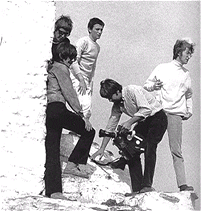 |
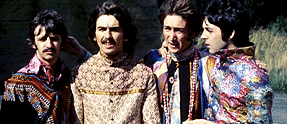 |
In the meantime, Paul had appeared on TV and radio shows in an attempt to reply to the hostile reaction from the critics. He was to ask: “Was the film really so bad compared to the rest of Christmas TV?” He added: "You could hardly call the Queen’s speech a gasser! Our problem is that we are prisoners of our own fame. We could put on a moptop show but we really don’t like that sort of entertainment any more. Sure, we could have sung carols, and done a first class 'Christmassy' show starring The Beatles with lots of phoney tinsel, like everybody else. It would have been the easiest thing in the world, but we wanted to do something different, we thought we would do a fantasy film without a real plot. We thought the title was explanation enough. There was no plot and it was formless – deliberately so, and those people expecting a plot were probably disappointed.” |
| In
1968 ‘Magical Mystery Tour’ was screened by Dutch Television on 10th
February and it was sold to Japanese Television in April. In May it
was shown at special screenings at selected cinemas in America, mainly
in Los Angeles and San Francisco, and a few months later it was premiered
at the Savoy Theatre, Boston, where it received positive reviews. In
the years since it was first screened, ‘Magical Mystery Tour’ has been
reappraised. Many have now agreed that the virulent criticism at the
time of its initial screening was unjust and perhaps biased, affording
critics their first opportunity of knocking The Beatles, who had been
riding high for so many years. Editor’s Notes: The journey begins with the words, ‘Away in the sky, beyond the clouds, live four or five magicians. By casting wonderful spells they turn the most ordinary coach trip into a Magical Mystery Tour. If you let yourself go, the magicians will take you away to a marvellous place. Maybe you’ve been on a Magical Mystery Tour without even realising it. Are you ready to go? Splendid!” |
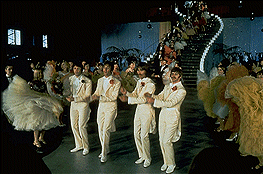 |
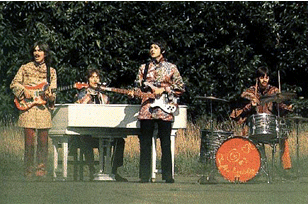 |
Paul
wrote the title song ‘Magical Mystery Tour.’ He wanted to convey the
sensation of excitement and jollity amid the car and coach noises as
the trip got underway and a sound effects album from the Abbey Road
archives was used, ‘Volume 36: Traffic Noise Stereo,’ when the recording
began on Tuesday 25th April 1967. Later, four trumpeters were hired to overdub a brass section: Roy Copestake, Elgar Howarth, David Mason and John Wilbraham. The song was featured on the British double EP set of ‘Magical Mystery Tour,’ the American album of the same name and also a British album of that title issued in 1976. The track was also featured on the ‘Reel Music’ compilation. |
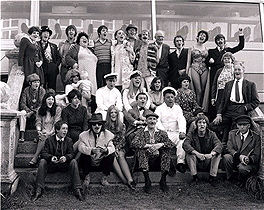 |
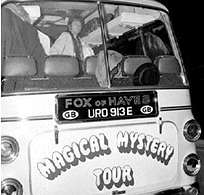 |
It was a Plaxton bodied example, URO 913E new to Fox, Hayes, in 1967, that featured in the film Magical Mystery Tour. The Beatles hired the coach from the Middlesex firm but, after filming, it disappeared for nearly 20 years. |
||